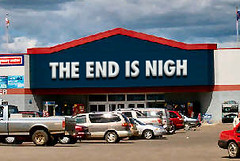A House Divided
There isn't much to add to the following report by Ali Akbar Dareini. It speaks for itself: Iran Says It Will Never Scrap Nuke Program:
The biggest failure in the unraveling Iranian nuclear gambit is the West's inability to put transatlantic politics aside and face the Devil in the eye. In Iraq, Europe and America had a powerful opportunity to play good cop/bad cop -- with America providing the stick, and Europe the carrot. The combination of American hard power and European soft power could have been far more formidable force for democracy than Anglo-American power alone.
Instead, Europe became enmeshed in the corrupting influences of seeing America primarily as a competitor, even adversary. Imagine the Iranian problem in the context of an Iraq where the transition to Democracy was truly the fruit of a combined Western effort. Instead, that effort was handicapped, with half of the West catcalling Iraq's liberation from tyranny. The American military is mighty, but stretched. If America is 'going it alone,' then so are the Europeans. Iran knows this.
It took two parties for America to 'go it alone:' it took America to push ahead on its own; and it took Europe to not participate, remaining on the sidelines or working against the Americans. The obvious fracture within the West over world power is a leveraging point for the Mullahs. Our greatest weakness is Iran's greatest asset.
It is difficult to envisage a credible, viable plan to keep the Mullahs from getting their isotopes. And time is running short.
TEHRAN, Iran (AP) - Iran will never scrap its nuclear program, and talks with Europeans are intended to protect the country's nuclear achievements, not negotiate an end to them, an Iranian official said Wednesday.
The remarks by Ali Agha Mohammadi, spokesman of Iran's powerful Supreme National Security Council, are the latest in a hardening of his country's stance amid ongoing talks with European negotiators. They also reflect Tehran's possible frustration at the lack of progress.
Europe is pressing Iran for concessions on its nuclear program, which the United States claims is aimed at producing atomic weapons. In exchange for nuclear guarantees, the Europeans are offering Iran technological and financial support and talks on a trade deal.
"We have the power to negotiate because we keep our (nuclear) achievements in our hands and we are negotiating to protect them," Mohammadi said Wednesday. "It's definite that we will protect our scientific achievements as a basic pillar, whether talks make progress or not."
...Aghazadeh, who also serves as head of Iran's atomic energy organization, suggested Iran was not happy with the progress of the talks, telling reporters: "We have to take the negotiations seriously and accelerate them."
European officials acknowledged the complexity of the negotiations, but said talks were going at a good pace and a diplomatic solution remained on track.
The talks have been carried out against a backdrop of U.S. warnings. In January, President Bush reaffirmed his support for a diplomatic settlement, but said he would not take any option off the table, including a possible military strike.
The biggest failure in the unraveling Iranian nuclear gambit is the West's inability to put transatlantic politics aside and face the Devil in the eye. In Iraq, Europe and America had a powerful opportunity to play good cop/bad cop -- with America providing the stick, and Europe the carrot. The combination of American hard power and European soft power could have been far more formidable force for democracy than Anglo-American power alone.
Instead, Europe became enmeshed in the corrupting influences of seeing America primarily as a competitor, even adversary. Imagine the Iranian problem in the context of an Iraq where the transition to Democracy was truly the fruit of a combined Western effort. Instead, that effort was handicapped, with half of the West catcalling Iraq's liberation from tyranny. The American military is mighty, but stretched. If America is 'going it alone,' then so are the Europeans. Iran knows this.
It took two parties for America to 'go it alone:' it took America to push ahead on its own; and it took Europe to not participate, remaining on the sidelines or working against the Americans. The obvious fracture within the West over world power is a leveraging point for the Mullahs. Our greatest weakness is Iran's greatest asset.
It is difficult to envisage a credible, viable plan to keep the Mullahs from getting their isotopes. And time is running short.

